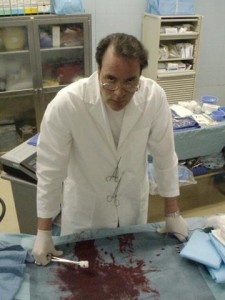September 27th, 2013 by Dr. Val Jones in Health Tips
2 Comments »
 I’ve been following (and often participating in) fitness trends for decades. From Jim Fixx’s outdoor running to Jane Fonda’s work out videos, to Conan-the-Barbarian body building, to step aerobics, to Tae Bo, to hot yoga, to Zumba, and now CrossFit… America’s exercise pendulum has been swinging wildly across the spectrum of possible physical activities. So have we finally reached a balanced mix of strength and cardio for optimum fitness? Maybe.
I’ve been following (and often participating in) fitness trends for decades. From Jim Fixx’s outdoor running to Jane Fonda’s work out videos, to Conan-the-Barbarian body building, to step aerobics, to Tae Bo, to hot yoga, to Zumba, and now CrossFit… America’s exercise pendulum has been swinging wildly across the spectrum of possible physical activities. So have we finally reached a balanced mix of strength and cardio for optimum fitness? Maybe.
CrossFit is a system of exercise and nutrition (founded in 2000 by Greg Glassman) that claims to “forge elite fitness.” Their Reebok-sponsored annual games boast that the winners have proven themselves to be “the fittest on earth.” CrossFit advocates a mix of aerobic exercise, gymnastics (body weight exercises), and Olympic weight lifting. Workouts are typically short—30 minutes or less—and intense, requiring maximal physical exertion.
I’ve attended multiple regional Cross Fit competitions, watched national games, competed in a CrossFit style competition, and worked out with several CrossFit athletes as well as attempted their work outs (WOD) on occasion, though I am not a member of a CrossFit gym. All this is to say that I’ve spent a good deal of time contemplating the merits of CrossFit, both as an athlete and as a physician trained in sports medicine. And here’s what I think:
Pros:
Difficulty. High intensity interval training (HIIT) is an effective and highly efficient way to improve muscle strength and cardio-vascular endurance. In my opinion, CrossFit’s greatest contribution to the fitness industry is its emphasis on HIIT, something that has not been sufficiently emphasized in the past.
Nutrition. CrossFit emphasizes the importance of healthy nutrition as part of its fitness strategy. This is sorely lacking in other systems/regimens. While I might quibble with some of the more extreme “Paleo” proponents within the CrossFit community, there’s no arguing that a diet rich in fruits and vegetables, lean protein, healthy oils, and complex carbohydrates (no sugars or refined flours) is a healthy way to eat.
Community. Peer support encourages consistency in participation. CrossFit does a good job in building community and making everyone feel welcome. All levels of fitness (and all ages) are welcome to join a CrossFit gym and participate to the best of their ability in the workout of the day (WOD).
Affordability. CrossFit gyms are relatively inexpensive to outfit (less high-tech equipment) and are easy to scale. For this reason they provide greater access to people at all income levels, which is a huge plus.
Portability. CrossFitters learn how to use their own body weight to create challenging exercise routines anywhere, anytime. There is no longer any excuse not to get a good workout in, whether you are traveling and can’t get to the gym or you are too busy to break free from the kids to do a more formal work out.
Cons:
Frequent Injury. CrossFit injury rates are substantially higher than most other fitness regimens. Herniated disks, muscle and tendon ruptures, rhabdomyolysis are not uncommon. In fact, most CrossFit athletes that I know presume that “injury just comes with the territory” and I frequently see Facebook photos of bloody/blistered hands as some kind of badge of honor. I myself sustained a low back injury even when carefully observing my technique during a CrossFit workout, and a dear friend actually ripped off one of the heads of his bicep when attempting an Olympic weight maneuver, while another friend fractured her wrist after falling down during a series of box jumps to exhaustion. Trust me when I say that if you do CrossFit long enough, you’re bound to become injured in some way.
Challenging Technique. Correct exercise form is hard to master, and since many CrossFit moves derive from gymnastics and Olympic weight lifting (sports that take many years to perfect), it is incredibly important to perform movements according to correct mechanical form. Although CrossFit experts strongly agree that good form is the key to safe and effective exercise, the fact is that people don’t always follow directions. In fact, most athletes that I’ve watched at CrossFit gyms suffer from poor form in one or more of their moves – sometimes because of inexperience, and other times because they are too exhausted to perform their final rep(s) correctly and their attention has waned. Functional movement is freer than the usual, controlled weight scenarios in a gym’s circuit training machines. And with that freedom comes the benefit of activating more muscles at a time, but the danger of injury, especially for new initiates or older athletes.
Peer Pressure. The flip side of having a “strong community” that encourages participation, is that the same community may push participants to engage in unsafe exercise practices. I’ve often seen well-meaning CrossFit instructors encourage people to pick up heavier weights than they feel comfortable with in order to push them to become stronger. There is a fine line between healthy encouragement to challenge yourself, and dangerously heavy weight lifting. It’s normal to want to “keep up with the Joneses” to your right and left during a WOD, but when Mr. Jones is a 250 pound tower of muscle, you might not want to be lifting the same weights.
Glorification of the mesomorph. There’s no doubt that committed CrossFitters develop enviably lean, muscular bodies. However, I wince a bit at the tendency for CrossFitters to promote the idea that their way is “THE best way” to be fit, and the bravado surrounding their competitions for “fittest on earth” is exclusionary and unfair. Just because an athlete was born with a different body type, ill-suited to Olympic weight lifting for example, doesn’t mean they can’t be fittest on earth (a rather subjective measure – why not an Ironman as the fittest?) There’s not much variation in the body types of those who are at the top of the CrossFit heap (i.e. large muscle mass, not too short or tall), which speaks to the fact that ultimately this sport is not optimal for all-comers (nor is the position of linebacker on a football team).
My bottom line: CrossFit must be approached with caution, though it provides some excellent HIIT and nutrition principles that can optimize one’s health. If you enjoy strength training (more than cardio or yoga for example) and like camaraderie but can resist the temptation to push yourself into the injury zone, then CrossFit may be for you.
I personally recommend (and participate in) what I would call “CrossFit light” – meaning workouts of similar CrossFit intensity but without extreme weight/maneuvers, and scaling up slowly (especially when new to exercise or a Masters athlete), adding additional cardiovascular training, and eating a diet slightly higher in complex carbohydrates than is generally recommended by strict “paleo” type CrossFitters. And of course, I do not believe that my way is the best or only way to be fit. If you like running, cycling, yoga, Pilates, or even step aerobics – good for you! Aim to be active for an hour/day – and add a little strength training in as you can. If you do that much, you may not be the “fittest on earth” but you’ll be doing more exercise than 96% of Americans!
August 4th, 2013 by Dr. Val Jones in Opinion, True Stories
2 Comments »

On Assignment In Idaho
It’s been a couple of months since my last post because I’ve been traveling around the United States working as a locum tenens (in Latin, “place holder” – a more elegant name than “temp”) physician. We’ve all heard of traveling nurses, but more and more physicians are also “living la vida locums,” as it were. There are actually over 100 agencies who find/provide temporary physician coverage for hospitals who need to fill gaps in their full timers’ schedules. You can find out more about these agencies at their trade organization site, the National Association of Locum Tenens Organizations (NALTO).
For those of my peers who’ve been curious about locums work, but haven’t tried it, I thought I’d provide you with some personal thoughts and insights in the form of Q&A. Please feel free to ask your own questions in the comments section and maybe we can generate a nice, interdisciplinary discussion about locums work. I’d love to hear from others who have worked locums!
Q: Why should I work as a locum tenens physician?
If you don’t mind travel and are a fairly adaptable individual (i.e. can learn new EMR systems, staff idiosyncrasies, and navigate hospital politics without excessive angst), then you can expect to make at least 33% more in salary working as a locum (with professional liability insurance, housing and travel covered included). In addition, you have no administrative or teaching responsibilities, coding/billing hassles, or staff management issues. You’re paid an hourly rate for a minimum number of hours, with overtime negotiable. You get to see different parts of the country, and can control where you go and how much you work. (E.g. Summers in Sonoma, winters in Florida… not a bad lifestyle choice.)
Q: What kind of physicians do locums work?
In my experience, there are four kinds of people who do locums work: 1) Retirees – those who have essentially retired from full time medicine and want to keep their hand in clinically without overwhelming responsibilities and work hours 2) Salary Seekers – those who want to make 33-50% more salary and don’t care where they live to do it (they work 22 days/month or more as a locums doc) 3) Dabblers – those who want to work part time because they are busy with another job or family responsibilities and 4) Problem People – those who have personality issues and/or a legal history that make it difficult to hold down a regular job.
I don’t know the relative numbers of these 4 subtypes of physicians who do locums, but I’d guess that 20% are Retirees (Rs), about 10% are Salary Seekers (SS’s), 60% are Dabblers (D’s), and 10% are Problem People (PP’s). I’m a D, and I have met Rs, SSs, and PPs on the work circuit. I’ve also spent time talking to internists and specialists who work as locums physicians so I have an idea of what others outside my specialty are up to.
Q: What’s the difference between locums agencies?
Each locums agency has its own “corporate culture” and some are more attentive to their physicians than others. For example, when you’re traveling en route to an assignment and your flight gets cancelled on a weekend, you suddenly realize how nice it is to have a responsive agency to help with travel triage. Choosing an agency is more than just finding the one that offers the best hourly wage, it’s about how they choose and negotiate with clients (hospitals), how many staff they have to help with payroll and travel, and if the recruiters themselves are patient and attentive. All of this is primarily learned by trial and error – alas. And I think it’s probably time to create a “Yelp” destination of sorts for physicians who are interested in locums work. I wish I had had one!
That being said, what I’ve learned is that agencies vary A LOT in what they offer you and that there is usually about 25% wiggle room in hourly rate negotiation, especially for highly-sought after specialties such as Internal Medicine. In one case, a client (hospital) confirmed to me that two different locums agencies presented the same candidate to them – one was charging $90/hour more for the physician, but the physician had been quoted the same hourly rate by both agencies.
One would think that there would be an advantage to being represented by the “Platinum level” locums agency because they’d negotiate higher pay rates for you, but what happens is that they negotiate high pay rates and then don’t pass it along. In the end, the only hospitals that use those companies are ones who’ve exhausted every other avenue. So if you work for a Platinum agency, you end up with an average salary working in the most difficult situations (i.e. where no one else would go and the hospital, in an act of desperation, had to pay through the nose for you.) In addition, I’ve had a Platinum agency take 3 months to pay me, whereas another agency regularly turned my time sheet into direct pay in 7 days.
So be forewarned – the biggest, shiniest agency might not be your best bet.
Unfortunately, smaller agencies (who may be more generous with salary rates) sometimes suffer from skeleton crew staffing and fall short of being able to triage travel disasters and manage client-related problems (e.g. the hospital said you’d see 12 patients a day but when you arrive they ask you to see 24) as needed.
When it comes to a locum agency, you want someone who’s not too big, not too small, and where you can establish a relationship with a recruiter who is responsive and smart. I cannot stress this enough. Your recruiter is your lifeline while you are on the job. Recruiters don’t just spend their time finding physicians to fill positions, they are the key point of contact between you and the hospital where you work. Their role is to lobby for you, and keep the hospital accountable for your work load and work environment. If the hospital promised that you’d only need to see X number of patients/day, then your recruiter is the one to hold them to that standard. If you are concerned about patient safety because staff members are incompetent in some way, then (believe it or not) your recruiter will convey those concerns to the hospital and get the problem solved.
So overall, your locums experience depends on the corporate culture of your agency, the size and number of travel/credentialing staff they have available 24/7, and the quality of recruiter assigned to your case.
In my next post I’ll cover the following questions:
Q: Where are the most favorable locums jobs?
Q: How can I negotiate the best salary?
Q: How do locums agencies decide how to match you with a given job opportunity?
Q: What is the licensing and credentialing process like? How do I make it easier?
July 5th, 2012 by Dr. Val Jones in Health Tips, Humor, Opinion
5 Comments »
-

- A Typical Jerk, M.D.
Editor’s Note: This post is meant to be tongue-in-cheek. We sincerely hope that our colleagues are not offended by the use of the term “jerk” to describe physician behavior. If you are a jerk, please feel free to leave a nasty complaint in the comment section of this post. Thank you!
Physicians have a reputation for being, to put it bluntly, jerks. It took me a long time to accept the fact that we are (on average) a disagreeable bunch, and my years of denying that there is a problem has finally given way to acceptance and even some degree of tolerance of “assholitry.” Few of us doctors think that we’re the one with the attitude problem, but I’m afraid that even the sweetest pediatrician can show some mighty claws when backed into a corner.
I didn’t think that I was a jerk until a few days ago when a surgeon made a medical error in the care of my loved one. I won’t go into details here, but let’s just say that evisceration was on the menu. My family member overheard one of the conversations and commented timidly, “I think you’ve probably just successfully alienated yourself from the entire medical community at Hospital X.” Yes, I was a total fire-breathing monster.
But this got me thinking – maybe if I explained all the reasons why doctors have bad attitudes, there would be a little more grace shown to us? Maybe our patients would be less offended and more understanding of our dispositions? I suspect that most people feel that there is “no excuse for rudeness” but I’ll offer a few nonetheless and see if I can’t change your mind. Here are the primary reasons that doctors are jerks:
1. We are afraid.
Being responsible for sick peoples’ lives is a scary thing. There are so many variables outside our control, and yet we believe that we must control the outcomes at all costs. It’s as if doctors somehow absorb the false belief that we can cheat death, and so when our patients don’t experience the optimal outcome from our every action and decision, we engage in some serious self-flagellation or (for those who possess a higher jerk index) we kick the proverbial dog (i.e. you).
Fear of inadvertent medical errors is a real butt-clencher for many doctors, and as science provides us with more insight into disease management we must be ready to do things differently, and to relearn everything we were taught. Keeping abreast of all these changes is very hard work, as there are over 6000 new research studies published world-wide each day. Our fear of failing to know everything we “should” causes many of us to hide behind a veil of toughness. Arrogance is often just a cover for vulnerability, and with so much information that we’re expected to digest, we are at risk for making a bad decision if we aren’t up to date. And when a doctor makes an error, he or she can pay a high penalty, including public humiliation by her peers, loss of her medical license, livelihood, the pain and suffering of legal action, and even confiscation of personal assets and savings.
And then there’s the daily fear of “fire-breathing monsters” like me. At any turn, irate family members, colleagues, hospital administrators, and staff can swoop in and criticize your best efforts.
2. We are hen-pecked.

- A Physician With Three Hospital Administrators
The constant juxtaposition of trivial and critical can make doctors seem dismissive and arrogant. This is a subtle point, but one that is really important to understand a physician’s mental state. Imagine that you’re tending to a dying man with a gunshot wound to the chest, and a hospital administrator taps you on the shoulder to ask if you could fill out a form about insurance coding. You would view that request as particularly annoying given the context in which it occurred, right?
This may be an extreme example, but similar scenarios play out in our work days constantly. We are frequently interrupted (in the midst of very grave conversations, for example) with requests for approval of Tylenol orders, coding clarifications for duplicate insurance documents, or updates of no apparent consequence (such as, “Dr. Jones, I just wanted you to know that Mrs. Smith did receive your Tylenol order.”)
The very act of doctoring can make us feel as if we’re undergoing harassment by the hopelessly inane, punctuated by terrifying bouts of near-death scenarios accompanied by the usual fire-breathing monsters. If that job doesn’t turn you into a jerk, then… you probably are a robot.
3. We are exhausted.
Sleep deprivation is a well-known form of torture used by interrogators to extract information from “evil-doers.” It is also used by residency programs to keep whining residents from having the energy to complain effectively or to organize their efforts against their torturers. Then once these doctors-in-training accept chronic sleep deprivation as the new-normal, they carry an expectation of it throughout the rest of their careers. Of course, sleep-deprived people are more likely to be irritable, short-tempered, impulsive, grandiose, and hostile – aka jerks.
4. We were probably jerks to begin with.
Getting into medical school is extremely competitive. Only the very top students make it, and they are generally ranked according to science test scores (not compassion scores or charming personality scores). Successful pre-meds are generally type A personalities with a fierce competitive nature. And what kind of person would sign up for a career where they are harassed, blamed, required to do endless paperwork of indeterminate usefulness, denied regular sleep, and endure hostility from staff, coworkers, family members, and error-prone colleagues? A person with a pretty thick skin and a high tolerance for sadism and/or masochism… also known as a jerk. So, for the few doctors who don’t enter medical school as fully formed jerks already (let’s say they didn’t realize what they were getting into), the work they do will thicken their skin eventually, creating jerk-like personality traits in the end.

- A High Jerk Index Surgeon
Is there a jerk scale in medicine? Who are the biggest jerks? Yes, all doctors exist somewhere on the jerk continuum, and you can roughly guess where they’ll be depending upon how likely that an encounter with them will end in your demise. Trauma surgeons, cardio-thoracic surgeons, and neurosurgeons have the strongest jerk traits, while pediatricians, physiatrists, and family physicians are probably on the other end of that scale. There are some exceptions, of course, but actually not many.
What can you do to make the best of having to work with a jerk? At some point, you or a loved one will need medical care (no one gets out of this life alive) so you will probably have to deal with some serious jerks along the way. Knowing that this is in your future, you should probably start planning how you will handle this now. I offer you my do’s and don’ts of jerk management, or how best to ally with your physician:
Don’t:
1. Bring your doctor more trivia. Jerks have a low tolerance for irrelevant details, largely because they are tortured by it daily (such as pages of EMR-generated duplicates of physical exam findings from interns). Think about what you really want to talk about with your doctor and don’t get side tracked with your own personal “hot flash tracker” data or other tangential story that is unrelated to your current problem.
2. Threaten your doctor with legal action or allusions to your “friend the lawyer.” The jerk you’re talking to is already frightened enough about frivolous law suits. If you tap into that fear he or she will just go into self-protection mode and probably harm you with excessive and unnecessary tests, consults, and referrals. Or even worse, maybe they’ll hide information from you.
3. Attack your doctor’s judgment directly. This is a tricky one because your doctor won’t always make the best clinical decision in your case, and you have the right to point that out. The best strategy for getting your way (assuming that you’ve found a true error) is to be friendly about it. Use the Socratic method if you can so that they’ll think they discovered the mistake themselves.
4. Fight fire with fire. You would think that you could get some respect from a jerk by being just as nasty to them as they are to you – and that strategy may work with playground bullies – but unfortunately that rarely helps in medical culture. More likely the physician will become quiet and simply resolve to stonewall you and be extra unhelpful in processing your care needs. You don’t need that.
Do:
1. Be prepared for your visit. Bring a list of your medications, relevant medical history and test results. Write down your questions in advance. Anticipate the questions that your doctor will ask you (if you can) and be ready with focused answers. You will look like a super-star and your doctor will be indebted to you.
2. Be understanding of our lateness. I know it drives you crazy and you feel disrespected by your doctor. But know that lateness can be caused by many things, including ill-prepared patients, really sick people, emergency surgery and golf games. If your doctor is a major jerk and the cause of his/her lateness is golf-related, then at least YOU will feel better if you presume he/she was delayed by a real emergency.
3. Be a “compliant” patient. Once you and your doctor decide upon a care or treatment plan that is right for you, try to stick with it. It’s in your best interest to do so and your doctor will love you for it. Sure, if he’s a big jerk he’ll only love you because your good outcomes make his performance measures (and payment structure) increase, but if he has a conscience he’ll also be genuinely pleased that you’re well.
4. Find another doctor if you need to. Although this isn’t always an option for folks in rural areas, if your doctor is impossible to work with, then you should find someone else to take care of you. Be very polite, get copies of all your medical records, and then take them elsewhere. Don’t be stoic and stick with a total jerk if your care is being compromised by his or her attitude and behavior.
So there you have it. When you have your next unsatisfactory encounter with me or one of my colleagues, please consider that there are some good reasons for our irritability. But being a jerk isn’t always a bad thing, because if your loved one needs a medical champion, then a fire-breathing monster is probably an excellent advocate. You can harness a monster for your purposes if you follow the do’s and don’ts of physician relationship management. I wish you luck with your future encounters with us!
December 19th, 2011 by Bryan Vartabedian, M.D. in Opinion
No Comments »

 Let’s say you’re a doctor and you have an idea, opinion, or a new way of doing things. What do you do with it?
Let’s say you’re a doctor and you have an idea, opinion, or a new way of doing things. What do you do with it?
It used to be that the only place we could share ideas was in a medical journal or from the podium of a national meeting. Both require that your idea pass through someone’s filter. As physicians we’ve been raised to seek approval before approaching the microphone.
This is unfortunate. When I think about the doctors around me, I think about the remarkable mindshare that exists. Each is unique in the way they think. Each sees disease and the human condition differently. But for many their brilliance and wisdom is stored away deep inside. They are human silos of unique experience and perspective. They are of a generation when someone else decided if their ideas were worthy of discussion. They are of a generation when it was understood that few ideas are worthy of discussion. They are the medical generation of information isolation.
I spoke with a couple of students recently about Read more »
*This blog post was originally published at 33 Charts*
December 12th, 2011 by Bryan Vartabedian, M.D. in Opinion
No Comments »

 I spoke to a group of academic physicians recently. Afterward I was and asked, “Shouldn’t my hospital be responsible for my digital footprint? I don’t have time to look after that sort of thing. And wouldn’t it make sense for them to promote my research?”
I spoke to a group of academic physicians recently. Afterward I was and asked, “Shouldn’t my hospital be responsible for my digital footprint? I don’t have time to look after that sort of thing. And wouldn’t it make sense for them to promote my research?”
4 thoughts:
1. Online reputation management of academic physicians should be an individual, not institutional, responsibility. The question reflects a belief that your reputation is the job of “the marketing people.” No institution will ever be as invested in your future as you are. While there are hospitals that do a good job supporting their faculty and staff, you can’t assume it to be the case. No one looks after you like you.
2. Dig your well before you’re thirsty. That’s the name of a brilliant pre-digital book written by Harvey Mackey. He suggested that the time to invest in relationships is before you need them. Medicine is changing fast and you’ll never know how long you’ll be where you’re at. Better yet, you never know what opportunities could come your way when people find you. And if you want to experience the land before time when people used colored pencils, Rolodexes, and rotary phones, read Dig Your Well. Read more »
*This blog post was originally published at 33 Charts*
 I’ve been following (and often participating in) fitness trends for decades. From Jim Fixx’s outdoor running to Jane Fonda’s work out videos, to Conan-the-Barbarian body building, to step aerobics, to Tae Bo, to hot yoga, to Zumba, and now CrossFit… America’s exercise pendulum has been swinging wildly across the spectrum of possible physical activities. So have we finally reached a balanced mix of strength and cardio for optimum fitness? Maybe.
I’ve been following (and often participating in) fitness trends for decades. From Jim Fixx’s outdoor running to Jane Fonda’s work out videos, to Conan-the-Barbarian body building, to step aerobics, to Tae Bo, to hot yoga, to Zumba, and now CrossFit… America’s exercise pendulum has been swinging wildly across the spectrum of possible physical activities. So have we finally reached a balanced mix of strength and cardio for optimum fitness? Maybe.
















